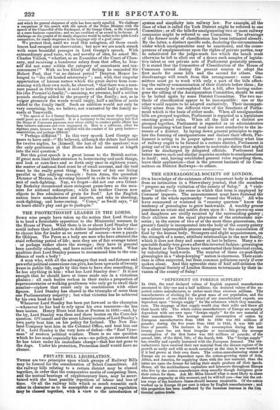PRIVATE BILL LEGISLATION.
.THBRE are two principles upon which groups of Railway Bills may be formed for the consideration of Select Committees. All the railway bills relating to a certain district may be classed together, in order that the comparative merits of competing lines, and the mutual bearings of supplementary lines, may be ascer- tained with the least possible repetition of labour and loss of time. Or all the railway bills which so much resemble each other in chaiscter as to be susceptible of one general regulation may be classed 'together, with a view to the introduction of system and simplicity into railway law. For example, all the lines of what is called the York District might be referred to one Committee ; or all the bills for amalgamating two or more railway companies might be referred to one Committee. The advantage of the former mode of classification has been intimated already. By the latter, a distinct specific code, declaring the circumstances under which amalgamations may be sanctioned, and the conse- quences of amalgamations upon the rights of private parties, may be substituted for the judge-made law which the bench must otherwise be left to elicit out of a dozen such samples of legisla- tive talent as our private acts of Parliament generally present. It is stated that the Committee of Classification of the House of Commons intend during the present session to adopt the first mode for some bills and the second for others. One disadvantage will result from this arrangement : some Com- mittees must go to work with only a part of the bills affect- ing the railway communication of their districts before them ; for it can scarcely be contemplated that a bill, after having under- gone the sifting of the Amalgamation Committee, should be sent to be bolted again by some District Committee. The two me- thods of classification appear to be incompatible : one or the other would require to he adopted exclusively-. Their incompati- bility arises from the different view of the functions of Parlia- ment which is the basis of either mode. When all amalgamation bills are grouped together, Parliament is regarded as a legislature enacting general rules. When all the bills of a district are grouped together, Parliament is regarded as an administrative board inquiring what lines of road are most conducive to the in- terests of a district. In laying down general principles to regu- late the forming of amalgamations and declare their effects, Par- liament is acting in its proper sphere : in prescribing what line of railway ought to be formed in a certain district, Parliament is going out of its own proper sphere to undertake duties that might better be discharged by delegated officials. Parliament had better reserve such and similar inquiries as relate to amalgamations to itself; and, having established general rules regarding them, leave their application—that is the present business of its Com- mittees on District Railways—to others.


























 Previous page
Previous page